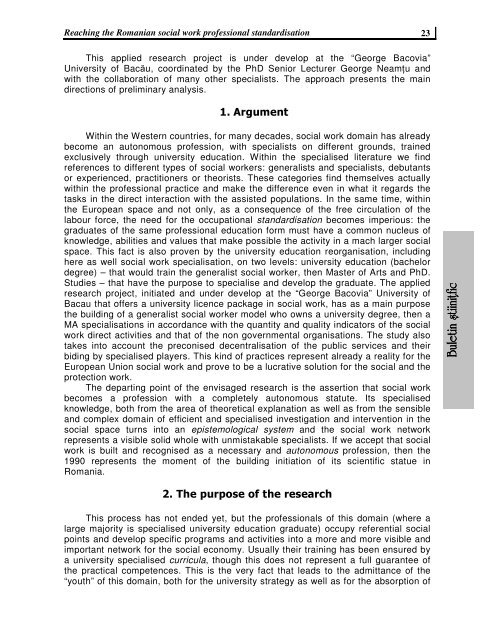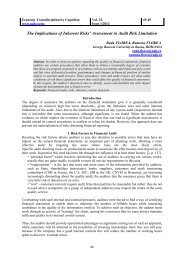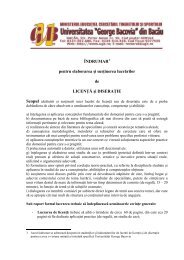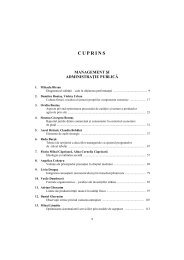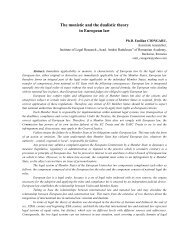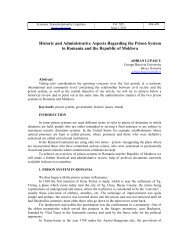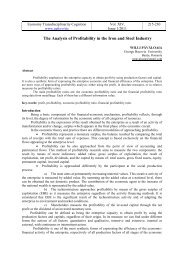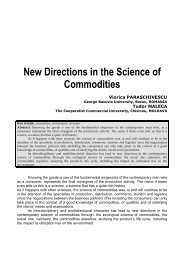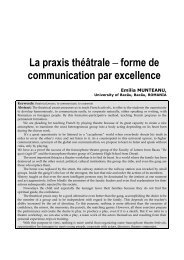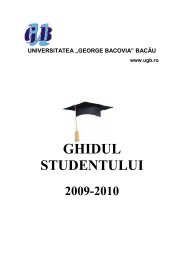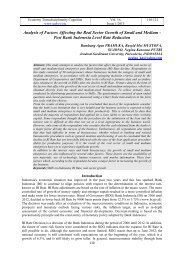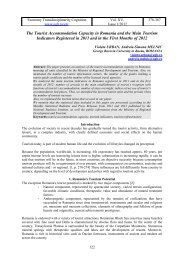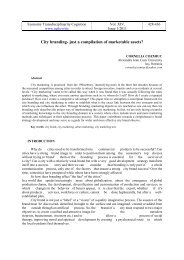BULETIN ÄTIIN IFIC - Universitatea George Bacovia
BULETIN ÄTIIN IFIC - Universitatea George Bacovia
BULETIN ÄTIIN IFIC - Universitatea George Bacovia
Create successful ePaper yourself
Turn your PDF publications into a flip-book with our unique Google optimized e-Paper software.
Reaching the Romanian social work professional standardisation 23<br />
This applied research project is under develop at the “<strong>George</strong> <strong>Bacovia</strong>”<br />
University of Bacu, coordinated by the PhD Senior Lecturer <strong>George</strong> Neamu and<br />
with the collaboration of many other specialists. The approach presents the main<br />
directions of preliminary analysis.<br />
<br />
<br />
Within the Western countries, for many decades, social work domain has already<br />
become an autonomous profession, with specialists on different grounds, trained<br />
exclusively through university education. Within the specialised literature we find<br />
references to different types of social workers: generalists and specialists, debutants<br />
or experienced, practitioners or theorists. These categories find themselves actually<br />
within the professional practice and make the difference even in what it regards the<br />
tasks in the direct interaction with the assisted populations. In the same time, within<br />
the European space and not only, as a consequence of the free circulation of the<br />
labour force, the need for the occupational standardisation becomes imperious: the<br />
graduates of the same professional education form must have a common nucleus of<br />
knowledge, abilities and values that make possible the activity in a mach larger social<br />
space. This fact is also proven by the university education reorganisation, including<br />
here as well social work specialisation, on two levels: university education (bachelor<br />
degree) – that would train the generalist social worker, then Master of Arts and PhD.<br />
Studies – that have the purpose to specialise and develop the graduate. The applied<br />
research project, initiated and under develop at the “<strong>George</strong> <strong>Bacovia</strong>” University of<br />
Bacau that offers a university licence package in social work, has as a main purpose<br />
the building of a generalist social worker model who owns a university degree, then a<br />
MA specialisations in accordance with the quantity and quality indicators of the social<br />
work direct activities and that of the non governmental organisations. The study also<br />
takes into account the preconised decentralisation of the public services and their<br />
biding by specialised players. This kind of practices represent already a reality for the<br />
European Union social work and prove to be a lucrative solution for the social and the<br />
protection work.<br />
The departing point of the envisaged research is the assertion that social work<br />
becomes a profession with a completely autonomous statute. Its specialised<br />
knowledge, both from the area of theoretical explanation as well as from the sensible<br />
and complex domain of efficient and specialised investigation and intervention in the<br />
social space turns into an epistemological system and the social work network<br />
represents a visible solid whole with unmistakable specialists. If we accept that social<br />
work is built and recognised as a necessary and autonomous profession, then the<br />
1990 represents the moment of the building initiation of its scientific statue in<br />
Romania.<br />
<br />
<br />
<br />
This process has not ended yet, but the professionals of this domain (where a<br />
large majority is specialised university education graduate) occupy referential social<br />
points and develop specific programs and activities into a more and more visible and<br />
important network for the social economy. Usually their training has been ensured by<br />
a university specialised curricula, though this does not represent a full guarantee of<br />
the practical competences. This is the very fact that leads to the admittance of the<br />
“youth” of this domain, both for the university strategy as well as for the absorption of


